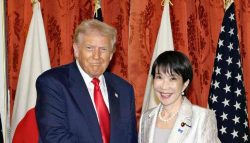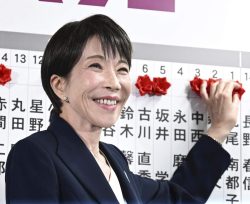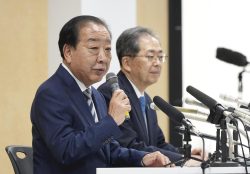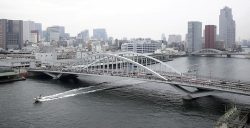Beyond the Paper Screen / Navigating the Future of Work: Change, Creativity and Human Resilience
13:46 JST, February 18, 2024
In my class, which is for students who are just starting their major in sociology and anthropology, I assigned a task to write about their future career hopes, dreams and aspirations. I reassured them that it was perfectly fine even if their ideas were still vague or didn’t seem realistic. Many students expressed their interest in becoming teachers or counselors, while a few others leaned toward careers in law, law enforcement or social work. There was also one student who simply said they wanted to become a “sociologist.” This mix of aspirations is quite typical for students studying sociology and anthropology. However, what surprised me was how many of these early college students appeared to be very certain about their career choices and were already actively preparing for their goals. They were taking the right classes, networking and even searching for internships or graduate programs.
But one student stood out among the rest. This senior was about to graduate at the end of the academic year but was still uncertain about their path. They had initially considered pursuing a career in the legal profession but were now having doubts. They had a deep passion for fashion and creative work, and they questioned whether they could ever feel truly enthusiastic about being an attorney. That’s more like it, I thought. Meandering is the privilege of youth, something one would find increasingly difficult to do as they age.
The concept of the “future of work,” which encompasses how work and workplaces will evolve in the years to come, is a matter of great concern in our time. Ongoing technological, social and economic transformations are reshaping the world of work, redefining the job market and the nature of work itself. Recent reports indicate that we are on the verge of witnessing a significant shift in how work is organized and executed, primarily due to the advent of artificial intelligence and other emerging technologies. For example, the World Economic Forum’s “Future of Jobs Report 2023,” a key source in this subject, outlines substantial transformations in the labor market, and the world of work more broadly, driven by technological advancements, notably AI, and wider societal and environmental changes. It emphasizes that these forces are not confined to the realms of technology-intensive or routinized work; they will permeate every industry and affect every position, every worker. In this ever-shifting environment, the report asserts, those with skills in analytical and creative thinking, alongside digital literacy, are projected to be increasingly important, reflecting the demand for workers capable of navigating the complex, evolving landscape of the future of work.
As I look back on my two-decade journey in higher education, I’ve noticed a significant shift in student attitudes toward career planning. The economic recession of 2008 and the subsequent global upheaval brought about by the COVID-19 pandemic have left a lasting impact on the mindset of the emerging workforce, giving rise to a generation increasingly anxious about their future and making their career choices primarily for economic stability and job security. Students become focused on their careers early to the point where they no longer have time to just be college students, even for the first couple of years, to explore different academic subjects or engage in activities for self-cultivation. They all clamber toward law, human services and government sector jobs without even thinking about how such work would fit with their own interests or abilities.
In my early teaching days and during my own college experience, students, including those in liberal arts majors not directly tied to professional paths, used to be more optimistic about their futures, and the majority of them were, in fact, able to secure interesting and meaningful jobs shortly after graduation. Back then, it was quite common for a senior like the one in my class, who was still contemplating their career path, to be the norm. This shift away from the optimism of the past underscores a pivotal moment in our collective narrative, where the pursuit of stability often takes precedence over the pursuit of passion.
It is not easy for my career-anxious students to face these changes. They’d rather look away and try to ignore all the scary changes. They can use all the help they can get to prepare for their future in this fast-changing world. And what will help them to navigate this landscape of uncertainty is the education that nurtures the qualities of creativity and adaptability — traits that have propelled humanity through centuries of change. The ability to make and use tools to extend our natural abilities is as much a hallmark of humanity, as encapsulated in the concept of Homo faber, or “human the maker,” as the idea of human as the thinker (Homo sapiens). As AI challenges the boundaries of what it means to work and to create, we are reminded that our species’ greatest asset lies in our capacity to create and to innovate, and our ability to reimagine and reshape the world around us. What our students need is the kind of education that fosters and develops human capacity to its fullest extent and connects it to our collective future, not to sacrifice one in the interest of the other. The educational institutions of tomorrow must rise to the occasion, fostering environments that empower students to navigate the complexities of the future with confidence and vision. In doing so, we are ensuring not only the future of our students but the future of our species.
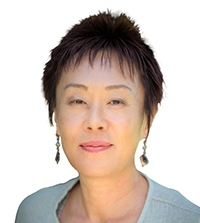
Sawa Kurotani
Kurotani is a professor of anthropology at the University of Redlands.
Top Articles in Editorial & Columns
-

40 Million Foreign Visitors to Japan: Urgent Measures Should Be Implemented to Tackle Overtourism
-

University of Tokyo Professor Arrested: Serious Lack of Ethical Sense, Failure of Institutional Governance
-

AI, Initially a Tool, is Evolving into a Partner – But is it a Good One?
-

Greenland: U.S. Territorial Ambitions Are Anachronistic
-

Policy Measures on Foreign Nationals: How Should Stricter Regulations and Coexistence Be Balanced?
JN ACCESS RANKING
-

Japan Institute to Use Domestic Commercial Optical Lattice Clock to Set Japan Standard Time
-

China Eyes Rare Earth Foothold in Malaysia to Maintain Dominance, Counter Japan, U.S.
-

Man Infected with Measles May Have Come in Contact with Many People in Tokyo, Went to Store, Restaurant Around When Symptoms Emerged
-

Japan, Qatar Ministers Agree on Need for Stable Energy Supplies; Motegi, Qatari Prime Minister Al-Thani Affirm Commitment to Cooperation
-

Australian Woman Dies After Mishap on Ski Lift in Nagano Prefecture



